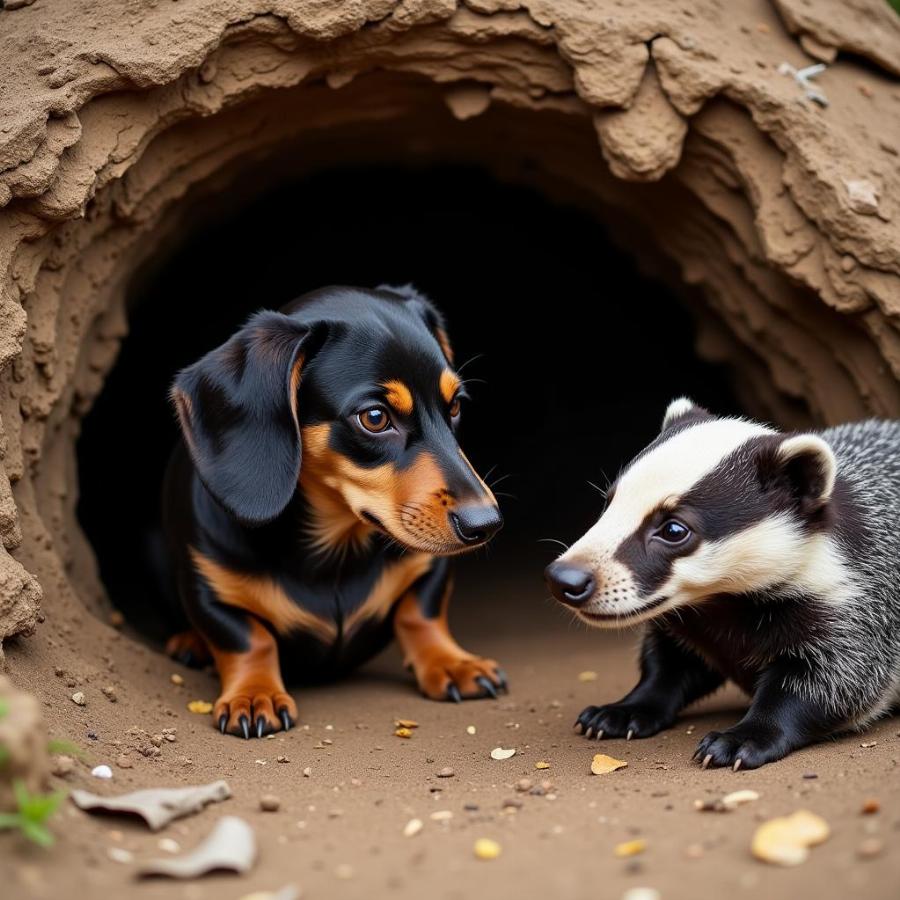German hunting dogs are renowned for their intelligence, trainability, and specialized skills in the field. This guide dives into the world of German hunting breeds, exploring their history, unique characteristics, and what makes them exceptional companions for both hunting enthusiasts and active families. We’ll cover everything from choosing the right breed to training and care, ensuring you’re well-equipped to welcome a German hunting dog into your life.
Understanding the Appeal of German Hunting Dogs
Germany has a rich history of developing specialized hunting dogs, each breed meticulously bred for specific tasks. Whether retrieving waterfowl, tracking game, or flushing birds, these dogs possess an innate drive and remarkable abilities. Their intelligence, coupled with their eagerness to please, makes them highly trainable and adaptable to various hunting disciplines. Beyond their hunting prowess, many German hunting breeds also make wonderful family companions, thriving in active households that provide them with ample exercise and mental stimulation.
Popular German Hunting Dog Breeds
From the versatile German Shorthaired Pointer to the tenacious Dachshund, there’s a German hunting dog breed to suit various needs and preferences. Let’s explore some of the most popular choices:
- German Shorthaired Pointer: Known for their versatility and all-around hunting skills, these dogs excel in pointing, retrieving, and tracking. Their energetic nature and friendly disposition make them excellent family dogs as well.
- German Wirehaired Pointer: Similar to their shorthaired counterparts, these dogs possess a wiry coat that provides excellent protection in dense cover. They are known for their strong hunting instincts and unwavering determination.
- Weimaraner: These striking silver-gray dogs are known for their elegance and speed. They are exceptional pointers and retrievers, particularly adept at hunting upland game.
- Dachshund: Though small in stature, Dachshunds were originally bred to hunt badgers. Their courage, tenacity, and keen sense of smell make them surprisingly effective hunters, even today.
 Dachshund Hunting Badger
Dachshund Hunting Badger
Training and Care for German Hunting Dogs
Training a German hunting dog requires patience, consistency, and positive reinforcement. Early socialization is crucial, exposing them to various sights, sounds, and experiences to ensure they develop into well-rounded adults. names for german dogs Obedience training is essential, laying the foundation for specialized hunting training later on.
- Exercise: German hunting dogs are energetic breeds that require significant daily exercise. Long walks, runs, or engaging in dog sports like agility or flyball can help meet their physical and mental needs.
- Grooming: Grooming requirements vary depending on the breed. Shorthaired breeds require minimal grooming, while wirehaired breeds may need occasional stripping to maintain their coat texture.
- Health: Like all breeds, German hunting dogs are prone to certain health conditions. Regular veterinary checkups and a healthy diet are crucial for maintaining their overall well-being.
Choosing the Right German Hunting Dog
Selecting the right German hunting dog requires careful consideration of your lifestyle, hunting needs, and experience level. Researching different breeds and speaking with reputable breeders can help you make an informed decision. dachshund dog hunting
Conclusion
German hunting dogs are exceptional companions for both hunting enthusiasts and active families. Their intelligence, trainability, and unwavering loyalty make them a rewarding addition to any household prepared to meet their specific needs. By understanding their unique characteristics and providing them with proper care and training, you can forge a strong bond with your German hunting dog and enjoy many years of companionship and adventure. good hunting dog names
FAQ
- Are German hunting dogs good with children? Many German hunting dogs can be excellent family pets, but early socialization and proper training are essential.
- How much exercise do German hunting dogs need? These energetic breeds require a significant amount of daily exercise, including long walks, runs, or engaging in dog sports.
- Are German hunting dogs easy to train? Their intelligence and eagerness to please make them highly trainable, but consistency and positive reinforcement are key.
- What are the common health concerns for German hunting dogs? Specific health concerns vary by breed, but some common issues include hip dysplasia, bloat, and certain eye conditions.
- Where can I find a reputable breeder of German hunting dogs? Researching breed-specific clubs and contacting experienced hunters can help you find reputable breeders. poodle hunting dog
Do you have other questions about Hunting Dogs?
You might be interested in reading about great dog literary.
Beaut Dogs is your trusted source for all things related to dog breeds. We provide comprehensive information, expert advice, and valuable resources to help you choose the perfect dog for your lifestyle and provide the best possible care. When you need expert advice, email us at [email protected] to get detailed and accurate information from Beaut Dogs. Visit https://beautdogs.com today to explore the wonderful world of dogs and learn how to be the best pet parent you can be.